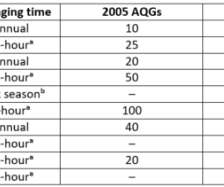Cutting Non-CO2 Pollutants Can Delay Abrupt Climate Change; The Fast Action Climate Agenda
Green Car Congress
OCTOBER 14, 2009
Noting the references in scientific and policy literature to the need for fast-action mitigation to help avoid DAI and abrupt climate changes, the authors define “fast-action” to include regulatory measures that can begin within 2–3 years, be substantially implemented in 5–10 years, and produce a climate response within decades.












Let's personalize your content